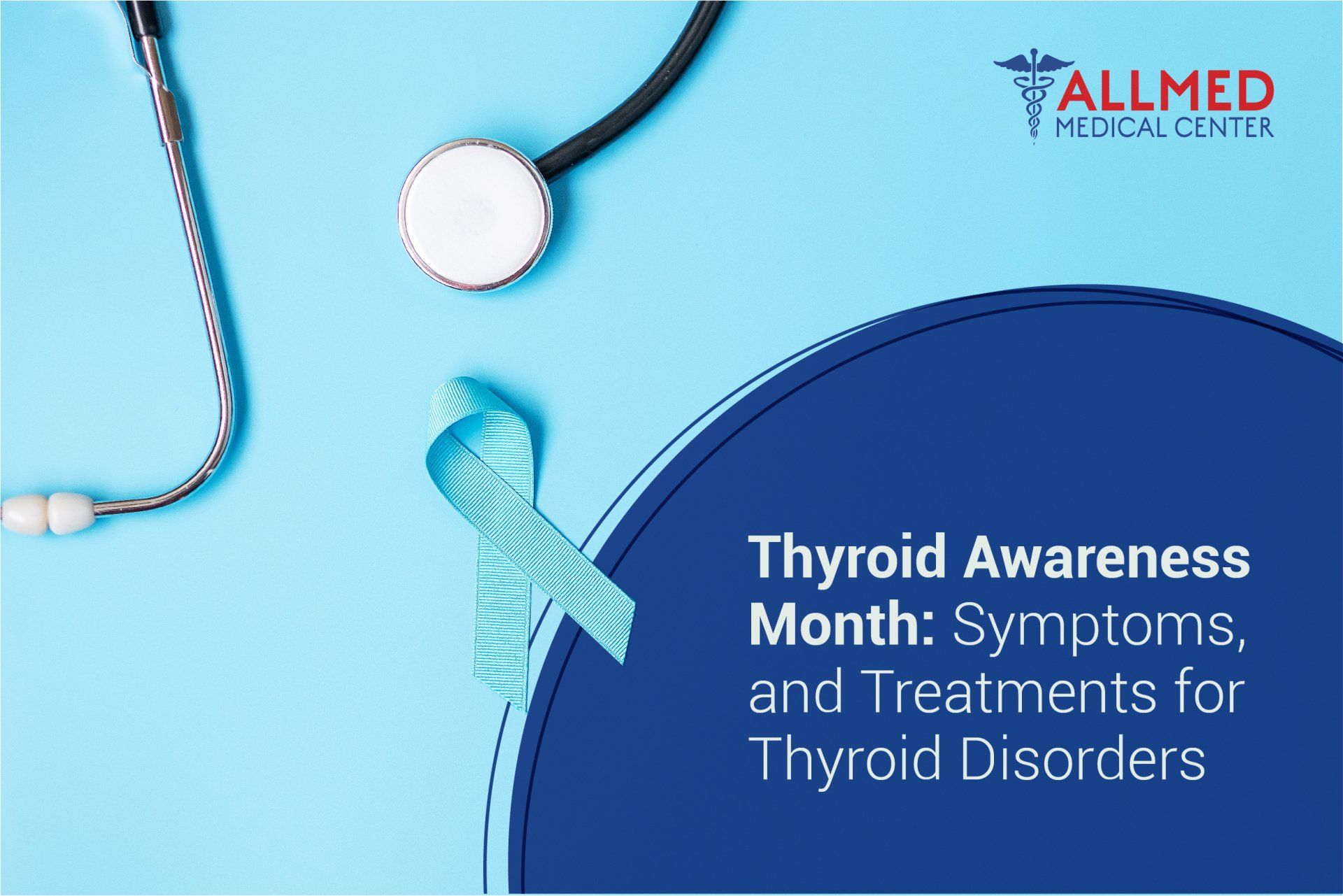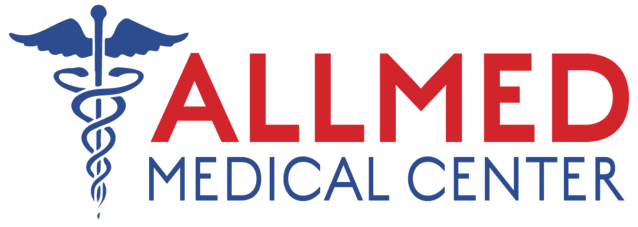Thyroid Awareness Month: Symptoms and Treatments for Thyroid Disorders

According to the American Thyroid Association, thyroid disorders affect nearly twenty million Americans. Did you know that almost 60% of these statistics are unaware of them and aren't being treated properly? This illness affects many individuals, and yet it's often overlooked.
January is Thyroid Awareness Month, making it a good time to bring attention to thyroid diseases. AllMed made this article to help you understand how they develop, what symptoms to look out for, and what to do if they occur.
What is Thyroid Gland?
The thyroid gland is a butterfly-shaped gland that sits nestled at the base of your neck. It produces hormones that control your body's metabolic rate and plays a role in all of your body's systems. This hormone helps control how fast the body uses energy, makes proteins, and controls how sensitive the body should be to other hormones.
The production of two hormones known as (hormone thyroxine) T4 and T3 stimulates almost every other organ in the human body. It regulates the metabolism and speed at which all cells in the body function. The thyroid impacts the heart, liver, brain function, digestive tract, bone strength, muscle tone, and nearly every cell in your body.
Different Types of Thyroid Disorders Explained
Thyroid disease — also called thyroid dysfunction or a thyroid disorder — is any condition that affects the normal production of thyroid hormones. These hormone deficiencies can cause various symptoms and affect all areas of your health- from your mood to your heart to your weight. If left untreated, thyroid problems can lead to more severe health problems like heart disease and osteoporosis. Below are some of the thyroid disorders.
Hypothyroidism
Hypothyroidism (underactive thyroid) is when the thyroid gland produces an insufficient amount of the hormone thyroxine. When there is not enough hormone, it causes the metabolism to slow down. As a result, these symptoms appear.
Symptoms:
- weight gain
- fatigue
- difficulty concentrating
- decreased sensitivity to cold
- constipation
- hair loss
- muscle weakness
- infertility problems
- menstrual irregularities
- brittle nails and dry skin
- depression
- puffy face
This is a lifelong condition, but it's manageable with medication and support. The most common treatment for hypothyroidism is synthetic thyroid hormone pills and capsules. Other treatments include natural thyroid hormone replacement, radiation therapy, and surgery. Many people with hypothyroidism take both types of substances, either at different times or combined into one pill. The goal of treatment is to make a person's hormone levels normal.
Hyperthyroidism
Hyperthyroidism (overactive thyroid) is a condition in which the thyroid gland produces too much thyroid hormone. This affects the metabolism as well, manifesting in the following symptoms.
Symptoms:
- fast heart rate
- rapid breathing
- fatigue
- irritability
- weight loss
- intolerance to heat
- anxiety
- nervousness
- increased thirst and urination
- diarrhea
- sore eyes
- tremors
Although certain iodine-containing drugs, radiation therapy can cause hyperthyroidism for cancer or toxins, most cases are due to an autoimmune disease known as Graves' disease. Treatment for hyperthyroidism usually involves medications, radioactive iodine therapy, surgery, or a combination of these treatments.
Goiter
A goiter appears as an enlargement of the thyroid gland. It mainly affects the lymph nodes, trachea, and esophagus. Sometimes, goiter can be painful. The cause of it is an iodine deficiency, leading to hypothyroidism. The condition is more than just an unsightly lump on your neck. In some cases, it can have serious health consequences and may even require surgery to remove part or all of the thyroid gland.
Symptoms:
- an enlargement just below Adam's apple on the front of the neck
- trouble swallowing
- a hoarse, deep voice
- a sensation of tightness in the throat
- feeling dizzy when you raise your arms above your head
Hashimoto's Disease
Hashimoto's disease (an autoimmune disease) accounts for 90 percent of people with hypothyroidism. It happens when the immune system mistakenly treats thyroid cells as foreign invaders and mounts an attack against them. The resulting inflammation can damage the thyroid and cause it to become less active, leading to several symptoms that can significantly impact your everyday life.
Symptoms:
- extreme fatigue
- depression
- weight gain
- joint pain
- hair loss
- frequent skin and eye infections
- irregular menstrual cycles
- hoarse voice
- constipation
- muscle cramps or spasms
Managing and controlling symptoms is central to treating Hashimoto's disease. There are two types of treatments: lifestyle changes and medications. These can help improve quality of life and prevent serious health problems.
Thyroid Cancer
Thyroid cancer occurs when these normal thyroid cells grow out of control and become a tumor. It typically manifests as a lump or growth in the thyroid gland, positioned near the base of the throat. At first, thyroid cancer is often asymptomatic. Over time, however, it can cause the symptoms listed below.
Symptoms:
- lump or nodule in the throat
- neck pain
- hoarseness or a change in your voice
- swelling of the neck
- having difficulty swallowing
Treatment for thyroid cancer may include surgery, radiation therapy, or chemotherapy. Surgery is the most common treatment option. If cancer has spread from its original location during surgery, the whole or part of the thyroid gland is removed.
What Causes Thyroid Problems?
Although thyroid problems are common in both men and women, women are almost three times more likely to have it than men. Most cases develop in women after menopause due to the decline in estrogen and progesterone levels. Additionally, the risk increases with age. Several factors can cause thyroid problems. These are:
Genetics – Thyroid diseases tend to run in families.
Iodine deficiency–
Iodine is a trace mineral critical for the normal functioning of your thyroid gland. If your diet does not have an ample amount of iodine, the thyroid will not produce enough thyroxine hormone, leading to hypothyroidism.
Autoimmune disease – The immune system normally protects the body from harmful substances called antigens. Diseases like Hashimoto's thyroiditis and
Graves' disease occur when the immune system misidentifies the thyroid gland as an antigen and attacks it.
Radiation– Exposure to radiation from nuclear accidents, medical treatments, or certain chemicals in the industry can damage the thyroid gland and cause hypothyroidism or hyperthyroidism (or both).
Infections – Viral infections such as mumps or mononucleosis can inflame or injure the gland and cause it to produce abnormal amounts of thyroid hormone. In some cases, a viral infection may result in an enlargement of the gland known as a goiter.
Medications–Some medications also cause thyroid problems as a side effect. One often overlooked is lithium, which is used to treat bipolar disorder.
Lithium can cause hypothyroidism in some patients, causing various health complications.
Combat Thyroid Disorders with AllMed!
The thyroid gland controls many bodily functions, so it's vital to ensure it's working right. If you have signs of thyroid disease, see one of our specialists here at AllMed Medical Center for diagnosis and treatment options. For consultations, get in touch with us today! Call 1-833-255-6332 to schedule an appointment online.
AllMed Medical CentersServing
Greater Sacramento
Allmed Medical Center | All Rights Reserved.









